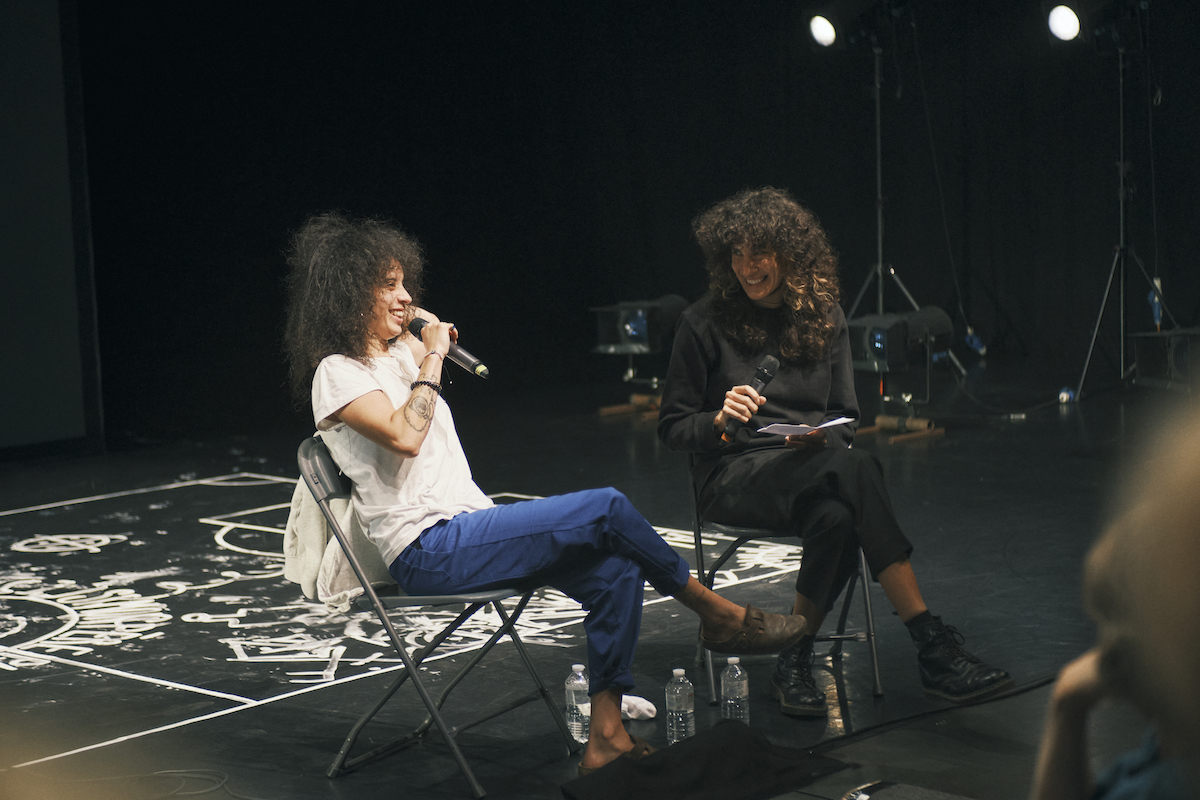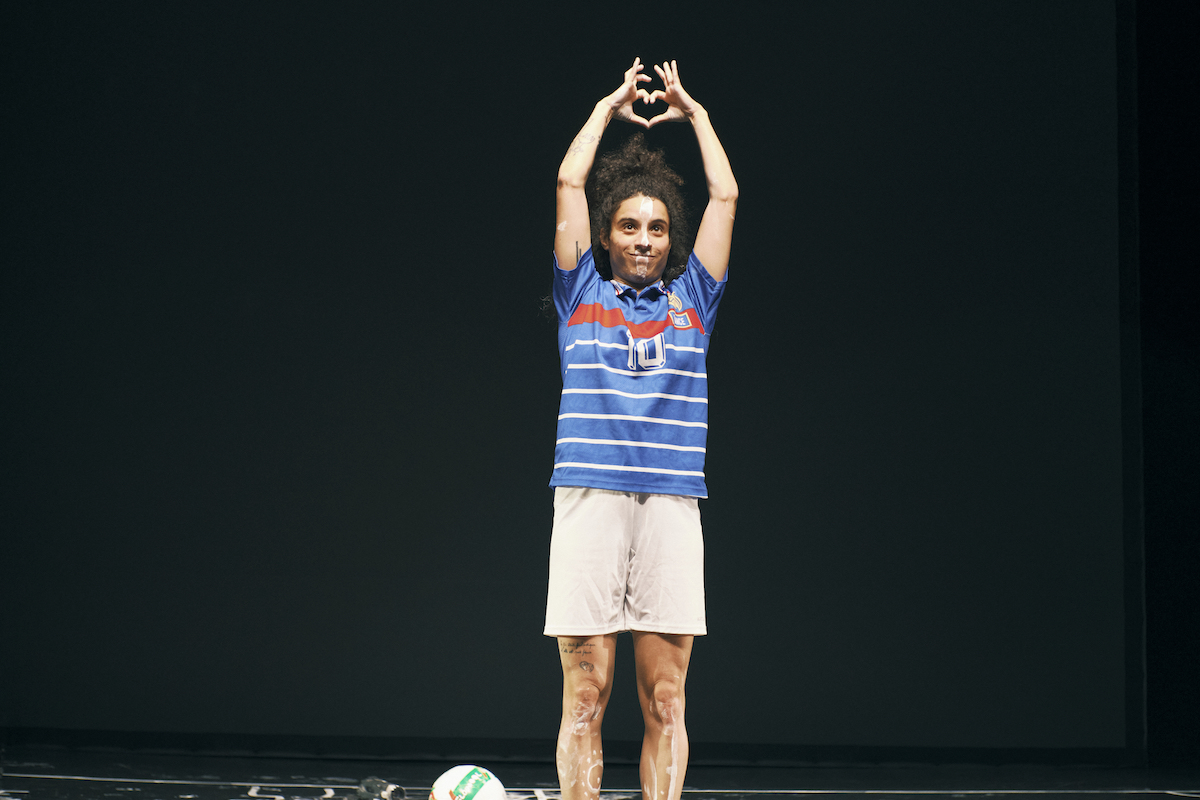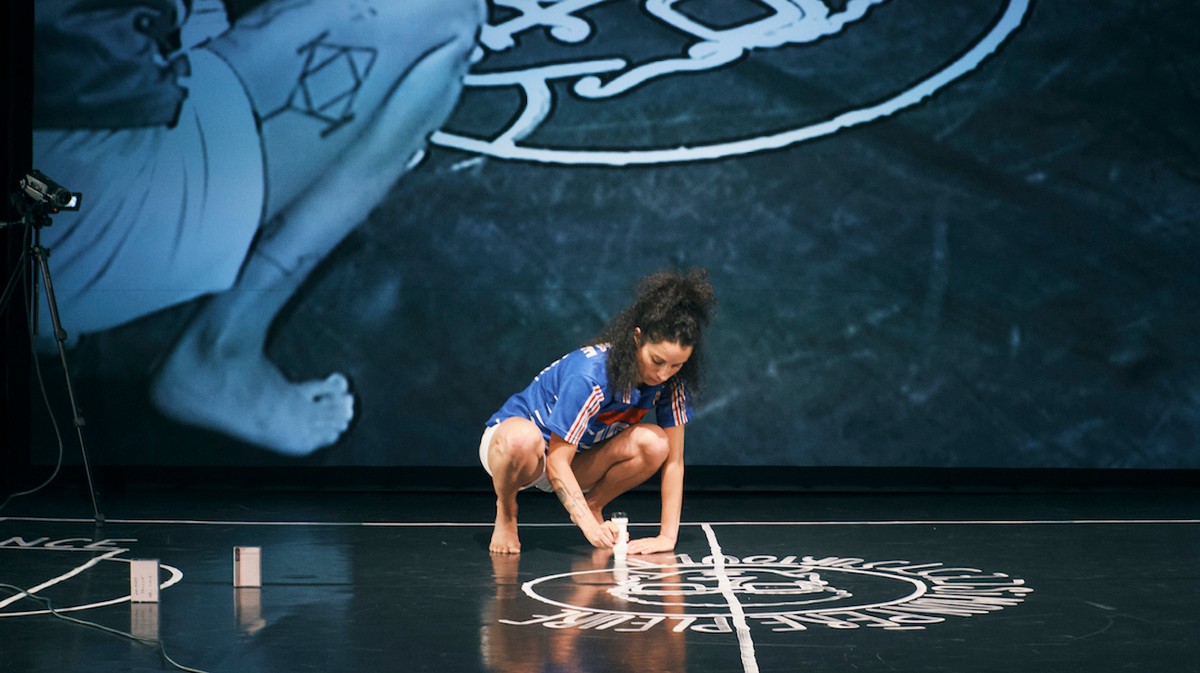This article originally appeared on VICE Belgium.
“Dad, do you know what the Algerian War and alcohol have in common? I've found three things: silence, taboo and shame.” That’s how French-Algerian artist Yasmine Yahiatene opens her solo show La Fracture (The Fracture), about her Algerian roots.
Yahiatene was born and raised in France by Algerian parents, who came to live in the country that formerly colonised their land of origin during the Algerian War of Independence. In this bitter conflict, which lasted from 1954 to 1962, France was accused of horrific war crimes, including the use of torture and chemical warfare.
About 40 percent of Algeria’s population was displaced. Some people lived in refugee camps; others followed friends and relatives who had relocated to France during the colonial period. The violence of the conflict has left its mark on those who experienced it, and many survivors still struggle to make sense of what happened or open up about it.

In the show, Yahiatene delves into her complex and personal family history to the sound of music from the Algerian singer-songwriter Idir and the rapper Soolking. She opens up about her father’s alcoholism and how he’s never told her about his past and his country, but also about their shared love for football and Zinedine Zidane.
I wound up seeing her performance twice. As a Belgian-Algerian, I identified deeply with it. The found footage she shows of her family reminded me so much of my own. She also plays a clip of Zidane's famous double against Brazil in the ‘98 World Cup and then runs euphorically across the stage. I remember this moment very well, too. I remember how proud and happy my whole family was – we even called up my grandma and auntie in Algeria.
I also know what it’s like to have a father who doesn't talk much. After seeing her play for the first time, I remember thinking to myself, ‘Actually, we’re all the same; we're all just as clueless.’
When I consider that thought more closely, there's some truth in it – in the sense that our parents, grandparents and great-grandparents who lived through colonisation and the war all have some key things in common. (Trauma, mainly.)
For Yahiatene, creating this show was healing. It let her to open up about topics that had always been taboo, like her father's alcoholism. It also helped her decolonise her own personal history and reconnect with her origins.
“My relationship with Algeria is non-existent, apart from my face and name,” she says as I interview her on stage at one of her performances. “This show has allowed me to reconnect with that part of myself. It meant understanding that I'm not white, blonde with blue eyes. It's all new to me!”
Many people of colour growing up in white spaces don’t realise they’re not white until a mirror is held up to them and makes them different. I remember realising it for the first time when I was still very young, in primary school, when a white classmate said in front of the whole class that my Moroccan friend and I smelled the same. That left a mark on me, even if I was too young to understand why. Of course, as you grow up, you get a lot more frequent, harsher and alienating comments.
For Yahiatene, things clicked much later. “When I was looking for a flat, I sent around the same email as a friend, except our names were different,” she explains. “He kept getting replies and I didn't. That was it. It's fairly common, unfortunately.”
This realisation marked the start of a deeper period of questioning for Yahiatene. She realised that decolonisation doesn't only happen physically – like when the French left Algeria – but also mentally. “Decolonisation is something you have to work on,” she says. “Whether you’re a person of colour or not, when you're born in Europe, you grow up thinking that this is the only way to do things. But more and more thinkers and artists tell us it doesn't have to be that way.”
She’s aware of the juxtaposition at play: While Yahiatene looks to dismantle the effect of colonialism on her identity, her parents have been down the exact opposite path, giving up their personal history to integrate and fit in. “[Integration] is giving up a part of yourself to fit in with the dominant country,” she says. “That's what we – and I – are putting into question today.”
Integration has consequences for the people who experience it themselves, but also for their descendants. “There’s a reason why I can't speak Arabic but speak French perfectly,” Yahiatene says. It’s something I’ve also always felt ashamed of.
In his book L'arabe pour tous – Pourquoi ma langue est taboue en France (Arabic for everyone – Why my language is taboo in France), author and journalist Nabil Wakim explains in detail why Arab-speaking immigrant parents are less likely to teach Arabic to their children, compared with people who speak other, less stigmatised languages. Once again, Islamophobia and racism are the core of the problem.
Wakim also shared the shame of not speaking the language of his origins and not being able to pass it on to his children. But in her play, Yahiatene wants to reclaim this missed heritage. “I think it's important to reclaim the part of ourselves that was stolen from us by colonisation without feeling bad about it,” she says. “This place of not knowing yourself has a right to exist. Many of us are in this situation!”
According to Yahiatene, this process of reclaiming is not just about learning, but about listening to yourself. "I don’t know much about history, dates or facts; I’ve seen the same documentaries you have,” she says. “But I act with my gut more than with my brain.”

During the play, Yahiatene asks her dad questions. “Why does Grandma have tattoos on her face? Why can't I speak Arabic? Why don't you tell me what happened in Algeria? Why can't I stop myself when I drink?” – questions that speak of heaviness and oppressing silences. Her mother’s side of the story is not included because Yahiatene is currently developing another show about her.
The question of intergenerational trauma is particularly relevant for Yahiatene, as she is about the same age as her father was when she was born. “I question my relationship [with alcohol] and how I can avoid making the same mistakes,” she says. “I’m trying to face this issue and solve it, or at least make it less taboo. Bringing it up on stage is a first step. It might help people to talk about it after the show – or maybe not.”
Football also plays an important role in La Fracture, both for personal and political reasons. When you first enter the performance space, you find Yahiatene wearing the blue strip of the French national team – number 10 like Zidane, of course – and drawing a football pitch on the floor of the stage with a white marker.
Yahiatene used to play football a lot growing up. Just like many in the Algerian diaspora, she was deeply marked by Zidane's legendary status. “I was living in the south of France at the time, and there must have been only two Arabs in my school,” she said. “The day after the final, we both went to school chests out, going: ‘Yeah, yeah, Zidane!’ It was a really powerful moment for us and for the whole community.”
Zidane has also paid the price of integration, Yahiatene says. When you think about it, the simple fact that he wears the French jersey but makes Algerians so proud is disconcerting. "When Zidane scores, he scores for France, and we're happy that he's French,” she adds.
But the myth of the beauty of diversity Zidane personified took a major hit when he famously headbutted Italy’s Marco Materazzi in the 2006 World Cup final. “That showed the whole problem with the idea of the ‘good’ and ‘bad’ Arab,” Yahiatene says.
Beyond the fact that it’s touched audiences, La Fracture also made Yahiatene’s family proud and helped them become closer. “A lot of people in my family saw it and that was quite beautiful,” she says. “In families like mine, we don't talk. My show helped to get things out that were a bit dead inside, but without talking about it.”
Her mother, aunts and grandmother returned to Algeria last year for the first time in 40 years. “They went back to their village, where my mother was born, and it was great to experience that from a distance,” she explains. “I like to think that it was thanks to the show.”
I attended Yahiatene's performance on Oct. 18, when the latest bombardment of Gaza by Israel had begun. Yahiatene and her team decided to add a statement at the end of the show, drawing a parallel between Algeria and Palestine. Yahiatene’s show is “profoundly anti-colonial,” she says. “We condemn and will condemn all forms of colonisation past, present and future.”
It’s a sad correlation that history repeats itself, just like trauma.

